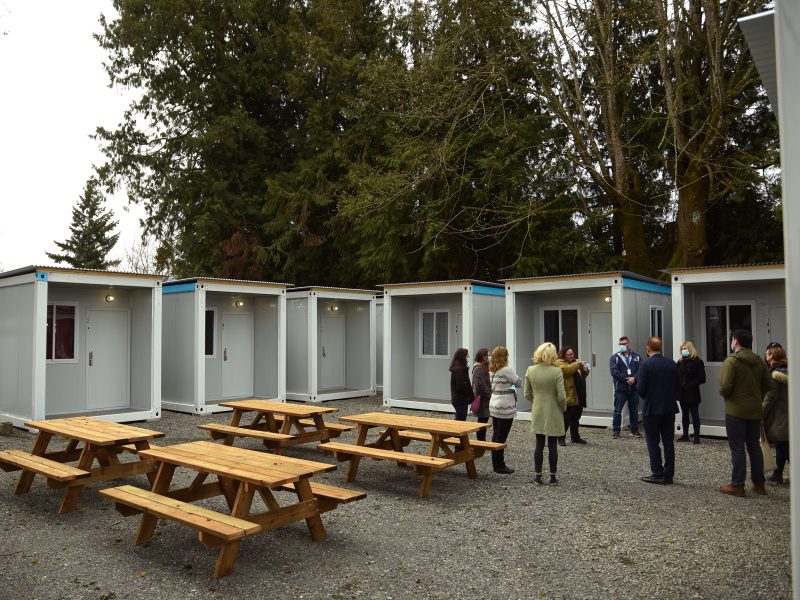
It’s almost like the Cow-op, a co-operative online market for Cowichan farmers and food producers, had been waiting for this moment.
Born in 2015 as a project of the Cowichan Green Community, the idea was that the Cow-op could help take a load off by dealing with all the marketing, packaging and administration, leaving farmers more time to do what they do best, says Derrick Pawlowski, who became the market manager a year ago.
But for years the online marketplace struggled to grow into the bold vision that birthed it, Pawlowski says. For consumers, it required a shift in habits and behaviour: Ordering online and then picking up the order at a set time and place a few days later. And for farmers? Some found they just weren’t selling enough to make it worth their while.
Cam MacDonald of Ol’ MacDonald Farm in Duncan says that, back in the early days, fulfilling Cow-op orders took half a day, and he’d pull in maybe $50 or $100 each week. “It was a huge interruption to my week of work,” he says. He stopped listing his produce, but never stopped believing in the Cow-op. “I felt guilty about leaving it,” MacDonald recalls. “It was such a great idea.”
And so the Cow-op continued along, serving a small pool of loyal, happy customers, but dependent on ongoing grants for its survival.

A pandemic hits
Fast-forward to March, 2020. The World Health Organization declares a pandemic. Restaurants close or reduce service. Farmers’ markets close or scale back. Producers have few options to get food to customers. And customers are looking for options besides going inside grocery stores.
The Cow-op sells more than just veggies. With offerings including dairy, eggs, meat, seafood, prepared foods and more, the market strives to be a place where you can do most of your grocery shopping, Pawlowski says.
And in this perfect storm, sales at the Cow-op explode. One week, there are 25 orders, then 68 the next, then 160, then 240, says Pawlowski. And the size of the average order doubles, from about $50 to over $100.
However, the pick-up process became challenging, in terms of being able to create and enforce adequate safety protocols, Pawlowski says. And he saw a need for helping customers stay home. So, in a week, the Cow-op team switched from a pick-up model to home delivery. In that frenetic April, when so many were out of work and looking for ways to help, volunteer delivery drivers responded to the call. And the customers kept coming back.
“It’s been really exciting to see that happening,” Pawlowski told The Discourse, back in early May. “Now, there’s a really strong interest and awareness around the importance of local food and food security and being resilient.”
Proving its value

The pandemic brought MacDonald back to the Cow-op, too. “When everything was up in the air over the you-know-what, I started listing there again,” he says. “And it just, as you know, exploded. And then it was like, ‘Damn it, why didn’t I plan triple the amount that I normally do for spring, in the fall?’ Because no one could keep up.”
At the same time, MacDonald started getting calls from friends and customers who wanted to buy from the farm directly. “I thought, oh, maybe this is the direction my business is going, and this is great because then I don’t have to pay the Cow-op a commission.” (Pre-COVID, the Cow-op marked up products 25 per cent over prices set by the sellers. During the pandemic, it dropped the markup to 15 per cent, to support farmers and customers, Pawlowski says.)
But setting up a good system to deal with all the customers who wanted to come buy from the farm was a challenge, MacDonald says.
“By the end of the day I realized that I got nothing done, I was totally frustrated,” he recalls. “I saved $50 and lost basically a day of work and went to bed frustrated because I was trying to do what Cow-op was already doing for me.”
If MacDonald was a Cow-op supporter before, now he’s a true believer. “I came away from it being like, ‘You want 15 per cent? Here, take 25 per cent, and may I kiss your ass while I’m at it?’”
Into the future
Sales have come down a little from their pandemic peak, Pawlowski said last week. But he’s still doing about seven times the business as pre-COVID. The slower pace has “given us time to really catch up to ourselves and to create good systems and rhythms in the warehouse,” he says.
In June, the Cow-op received a $100,000 grant to spend a year developing its home delivery system. As volunteer drivers dropped off, the Cow-op began calling on its members to volunteer for delivery shifts. Now, the Cow-op is able to hire people to figure out what a sustainable delivery system might look like in the future.

The Cow-op is also planning for neighbourhood kiosks where customers can come and pick up orders using a combination code, Pawlowski says. “The goal is to make it more accessible for people to be able to walk around the corner from their home to pick up their orders.” For now, there are pick-up locations in Duncan and in Victoria in addition to home delivery throughout the Cowichan Valley Regional District.
Pawlowski is also testing a new wholesale marketplace for chefs and food producers. It’s a lot like the retail version, but there’s a $50 minimum order, and the Cow-op’s markup is just 7.5 per cent, Pawlowski explains. And the offerings are different, with more bulk options.
Already, some producers that sell on Cow-op, including That’s My Jam! and Farm’s Gate Foods and Catering, are buying produce wholesale to use in their products that they then sell again on the Cow-op, Pawlowski says.
“We’re seeing this loop just continually get folded in on itself, of things being extremely local, and it all being redistributed within this local community, and raising each other up,” he says. “So that’s really exciting and cool to watch unravel.”
Towards a stronger local food system
While the pandemic has been tough on many farmers, it has also pushed innovation in local food systems, Pawlowski says. Public awareness on the importance of local food is growing, he says.
It’s an interesting time in the world, driven by digital technology and innovation, Pawlowski says. Online food shopping and delivery is still pretty new. “Seeing the local food movement really have access to this emerging trend, I think it’s really important.”
Pawlowski says he believes that food security in Cowichan will ultimately benefit from the changes and innovations forced by the pandemic. “I think it will only be stronger in the long run because of it.” [end]
The author of this story became a Cow-op customer after she began reporting this story, and is thrilled that she can have local Cowichan foods delivered to her doorstep all the way out in Youbou.
Editor’s note: Aug. 20, 2020: A previous version of this story said that the minimum order for wholesale customers is $250. While that was true at the time of the interview, the minimum order since dropped to $50, and the story has been updated to reflect this.



